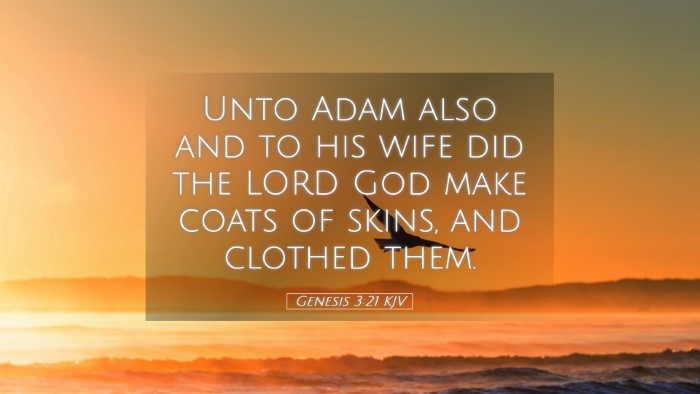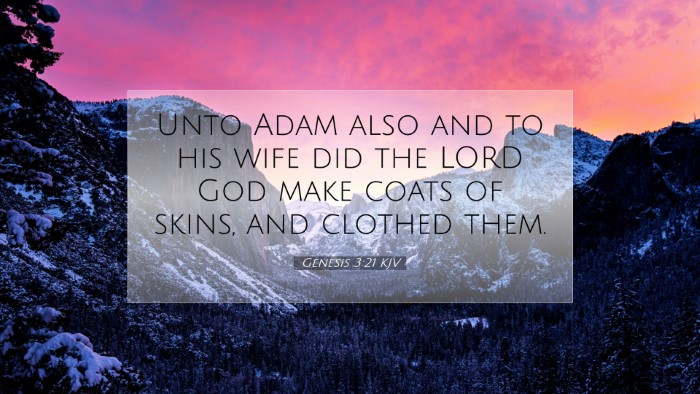Bible Commentary on Genesis 3:21
Verse: "And the LORD God made for Adam and for his wife garments of skins and clothed them."
Introduction
Genesis 3:21 marks a pivotal moment in the narrative of the fall of man, encapsulating the consequences of sin and the grace of God in response to human disobedience. This verse illustrates divine mercy and serves as a foundation for understanding the broader themes of redemption and atonement throughout Scripture.
Insights from Public Domain Commentaries
Matthew Henry's Commentary
Matthew Henry emphasizes the significance of God clothing Adam and Eve after the fall. He notes that the first act of God’s mercy is demonstrated through the provision of garments, which both provides physical covering and symbolizes a deeper spiritual covering. Henry writes:
"In this we see God's care for mankind, even in the midst of their shameful state; He provides them with sufficient covering to protect them from exposure, which underscored the consequences of their sin."
Henry further elaborates on the transition from fig leaves—symbolizing human efforts to cover sin—to garments of skins, which denote a greater need for a covering that only God could provide. This transition signifies the inadequacy of human attempts to remedy their sinful state.
Albert Barnes' Notes on the Bible
Albert Barnes brings attention to the materials used for the garments: "garments of skins." He posits that this act foreshadows the sacrificial system established in the Old Testament. Barnes states:
"The skins denote that an animal was slain; thus, establishing a sacrificial act that connects the covering of sin with the shedding of blood, a theme that will permeate scripture and culminate in Christ’s ultimate sacrifice."
Barnes underscores that God's provision was not only practical but also deeply theological, illustrating the need for atonement through sacrifice, which points to the coming Redeemer.
Adam Clarke's Commentary
Adam Clarke offers a detailed examination of the language and intent behind God’s actions. He highlights that the verb "made" indicates a deliberate act of creation, showing God’s initiative in addressing the dire situation of Adam and Eve. Clarke states:
"This act was a divine intervention, highlighting God's continuous engagement with humanity even after their rebellion against Him."
Clarke also discusses the significance of God providing clothing, which symbolizes not just physical necessities but also divine grace. He comments on the need for righteousness that fuels the inherent human desire to cover one's shame:
"The covering signifies a deeper fulfillment of righteousness, emphasizing that while mankind attempts to cover their sin, it is only through God’s intervention that true righteousness can be obtained."
Theological Implications
The act of clothing Adam and Eve involves profound theological implications that reflect God's nature and His relationship with humanity:
- Divine Mercy: God's response to sin was not immediate judgment but rather an act of mercy, illustrating His desire for reconciliation rather than destruction.
- Foreshadowing Atonement: The garments of skins point to the necessity of sacrifice for atonement, foreshadowing Christ’s sacrificial death which fulfills the law of sacrifice.
- Spiritual Covering: Just as physical garments cover shame, God provides a spiritual covering through the righteousness of Christ, restoring the broken relationship caused by sin.
Conclusion
Genesis 3:21 serves as a critical junction in understanding the nature of sin, judgment, and grace within the biblical narrative. Through the provision of garments of skins, God reveals His unyielding compassion and foreshadows the ultimate sacrifice of Jesus Christ. This verse invites pastors, students, theologians, and scholars to reflect on the depths of God's mercy and the profound implications of covering, both physical and spiritual, that He provides to humanity even in the wake of their rebellion.
In the context of pastoral teaching and theological reflection, Genesis 3:21 should compel the faithful to recognize the continuity of the Gospel narrative and the assurance of God’s provision in the face of human failure. This understanding enriches not only personal faith but also communal worship and the mission of the Church to represent the grace of God amidst a broken world.


